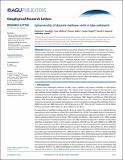| dc.contributor.author | Pillsbury, Liam | |
| dc.contributor.author | Weber, Thomas | |
| dc.contributor.author | Scandella, Benjamin | |
| dc.contributor.author | Ruppel, Carolyn | |
| dc.contributor.author | Hemond, Harold F | |
| dc.contributor.author | Juanes, Ruben | |
| dc.date.accessioned | 2017-06-28T18:56:18Z | |
| dc.date.available | 2017-06-28T18:56:18Z | |
| dc.date.issued | 2016-05 | |
| dc.date.submitted | 2016-03 | |
| dc.identifier.issn | 0094-8276 | |
| dc.identifier.uri | http://hdl.handle.net/1721.1/110359 | |
| dc.description.abstract | Methane is a potent greenhouse gas whose emission from sediments in inland waters and shallow oceans may both contribute to global warming and be exacerbated by it. The fraction of methane emitted by sediments that bypasses dissolution in the water column and reaches the atmosphere as bubbles depends on the mode and spatiotemporal characteristics of venting from the sediments. Earlier studies have concluded that hot spots—persistent, high-flux vents—dominate the regional ebullitive flux from submerged sediments. Here the spatial structure, persistence, and variability in the intensity of methane venting are analyzed using a high-resolution multibeam sonar record acquired at the bottom of a lake during multiple deployments over a 9 month period. We confirm that ebullition is strongly episodic, with distinct regimes of high flux and low flux largely controlled by changes in hydrostatic pressure. Our analysis shows that the spatial pattern of ebullition becomes homogeneous at the sonar's resolution over time scales of hours (for high-flux periods) or days (for low-flux periods), demonstrating that vents are ephemeral rather than persistent, and suggesting that long-term, lake-wide ebullition dynamics may be modeled without resolving the fine-scale spatial structure of venting. | en_US |
| dc.description.sponsorship | National Science Foundation (U.S.) (1045193) | en_US |
| dc.description.sponsorship | United States. Department of Energy (DE-FE001399) | en_US |
| dc.language.iso | en_US | |
| dc.publisher | American Geophysical Union (AGU) | en_US |
| dc.relation.isversionof | http://dx.doi.org/10.1002/2016GL068668 | en_US |
| dc.rights | Article is made available in accordance with the publisher's policy and may be subject to US copyright law. Please refer to the publisher's site for terms of use. | en_US |
| dc.source | MIT Web Domain | en_US |
| dc.title | Ephemerality of discrete methane vents in lake sediments | en_US |
| dc.type | Article | en_US |
| dc.identifier.citation | Scandella, Benjamin P.; Pillsbury, Liam; Weber, Thomas; Ruppel, Carolyn; Hemond, Harold F. and Juanes, Ruben. “Ephemerality of Discrete Methane Vents in Lake Sediments.” Geophysical Research Letters 43, 9 (May 2016): 4374–4381 © 2016 American Geophysical Union | en_US |
| dc.contributor.department | Massachusetts Institute of Technology. Department of Civil and Environmental Engineering | en_US |
| dc.contributor.department | Massachusetts Institute of Technology. Department of Earth, Atmospheric, and Planetary Sciences | en_US |
| dc.contributor.mitauthor | Scandella, Benjamin | |
| dc.contributor.mitauthor | Ruppel, Carolyn | |
| dc.contributor.mitauthor | Hemond, Harold F | |
| dc.contributor.mitauthor | Juanes, Ruben | |
| dc.relation.journal | Geophysical Research Letters | en_US |
| dc.eprint.version | Final published version | en_US |
| dc.type.uri | http://purl.org/eprint/type/JournalArticle | en_US |
| eprint.status | http://purl.org/eprint/status/PeerReviewed | en_US |
| dspace.orderedauthors | Scandella, Benjamin P.; Pillsbury, Liam; Weber, Thomas; Ruppel, Carolyn; Hemond, Harold F.; Juanes, Ruben | en_US |
| dspace.embargo.terms | N | en_US |
| dc.identifier.orcid | https://orcid.org/0000-0002-6684-6426 | |
| dc.identifier.orcid | https://orcid.org/0000-0003-4984-7870 | |
| dc.identifier.orcid | https://orcid.org/0000-0002-7370-2332 | |
| mit.license | PUBLISHER_POLICY | en_US |
